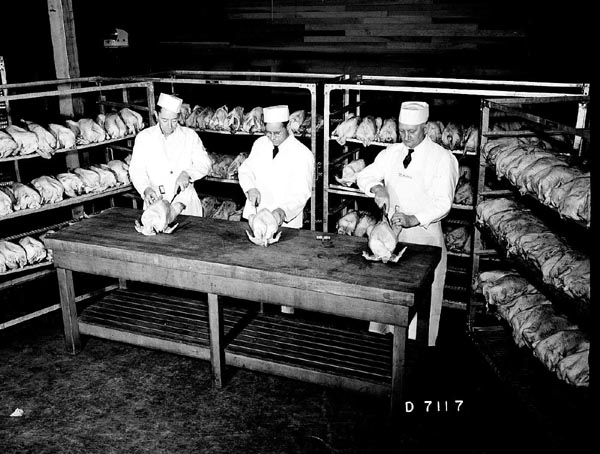[Interviewed by S. L. Sanger, from Working on the Bomb: An Oral History of WWII Hanford, Portland State University, 1995]
I was living in Yakima, and they were advertising for help at Hanford. So a friend and I decided to go over. We went to Pasco, and signed in. They took our fingerprints and family history and then we went by bus to Hanford. I was a widow at that time, 43 years old and had three kids. That was in the spring of ’43. Hanford Camp was just opening, and at first we stayed in the school house, but they could put up a barracks in two or three days, and I lived in the first women’s barracks. I worked in a mess hall, waiting tables. There were lots of nice people there. I recall one man gave me $5, and said you have always been nice to me and helped when I needed some food. I didn’t want to take it, I felt so dumb.
One time the men started screaming and yelling about some bad fish, it smelled terrible, oh, they got mad, they screamed and they yelled. One man threw his fish on the floor. That made me mad, and when the same man wanted more butter I told him I wouldn’t give him more butter even if they had it. He looked at me, and said, “I’m awful sorry.” Some of the cooks were greenhorns. One put a 100-pound sack of potatoes in the steamer, sack and all.
The barracks life, well, that was real nice. There were an awful lot of rough people there and they came from Chicago and everywhere. But I made a lot of friends and had a good time. They had a big high fence around the women’s barracks, way way high, and at the top they had barbed wire. So the men couldn’t climb over, you couldn’t trust those guys. They had a man always at the gate, and he always questioned you if any men were coming in. Check-in, check-out.
We used to hear about people being killed, maybe somebody was killed and their body was in a garbage can. I think that actually happened. One time, at the recreation hall a bunch of us were sitting out and drinking pop and we saw the guards taking a man out, and he had one of those old long butcher knives. They took it away from him, so what he was trying to do, I don’t know. There was lots of nice people and some not so nice.
On entertainment nights, I always told the girls not to go by themselves, never go alone with anybody. I had a little Indian girl friend, my roommate, my partner, she called me mom. She was from North Dakota. She worked in the mess hall. She would bring some of these men over to meet me, and of course I had red hair and was real light-complected and she was so dark. They would wonder why she was calling me mom, and I would tell them, well, you know her dad could have been dark.
If anyone ever talked about his work, he was canned. We never knew what we were doing out there. All we were ever told was we were doing some-thing to win the war.
Once, I was away from Hanford for two days, and when I came back I didn’t know where I was, they used to put up a building in two days. Everything out there was sheer hurrying. When we packed up and left it was like a funeral. All those mobs of people, then nothing. I went to Richland then and worked in the mimeograph room and at a post office. I didn’t stay long. I left and come back to Yakima.




